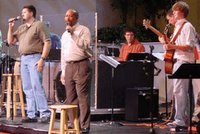
Thought I'd share with you some key insights regarding blogging on LifeWay Explore the Bible lessons the past eight months. Starting last May, the site now has almost 300 monthly visitors who view about 1,000 pages per month. The site ended January with 82 regular, returning monthly users and 37 weekly users. These individuals are anonymous for the most part (unless they identify themselves). Regular users (as opposed to visitors) make multiple visits to the site each month and spend time reading multiple pages. The highest number of visitors comes each Saturday although there is good traffic everyday except Sunday. The site is "syndicated" and currently has 11 subscribers.
Visitors mostly come from Texas, North Carolina, Michigan, Georgia, Virginia, Missouri, Florida, California, Tennessee, Louisiana, South Carolina, Illinois, New York, Indiana, Mississippi, Alabama, Kentucky, Colorado, Kansas, Oklahoma, and Washington. The site has incoming links from 5 other sites, but visitors find the site primarily through a search engine (eg. MSN, YAHOO, GOOGLE). The site has no connection with the LifeWay organization.
Site users leave very few comments. This implies that the material does not invite dialogue, or that teachers are not interested in discussing lesson preparation. For example, a "political" blog will garner heavy commenting as people share their opinions. A "cultural blog" on some current event will garner several comments per entry. However, a blog on Bible lesson preparation attracts an audience with practically no interest in dialogue. If this is a fact of life, then it may be more appropriate to team with other teachers to maintain the site. I’m praying for God to give me wisdom about this.
Awareness of the site remains low in my opinion. Ideally, it would be great if there was some way to create awareness among Baptist teachers in an efficient manner, but I know of no way to do this. One person suggested creating an email chain announcing the site. Any suggestions to improve the blog would also be welcomed! Without interaction and feedback, site changes are little more than stabs in the dark.
The blog reflects what I normally go thru in terms of lesson preparation. It is only extra work in the sense that the material must be formalized for blogging (as opposed to just sending myself a note thru email for later use in final lesson preparation).
I think of the blog as a virtual “teacher’s meeting” on lesson preparation. The goal is to suggest teaching ideas as opposed to providing a detailed lesson plan.
Thanks to all who use the site!
Blessings,
Ronnie
 Google “true worship” and you get 453,000 search results, but “empty worship” yields only 778. Seems like there are lot’s of opinions on what's “true worship”. How do you define true worship?
Google “true worship” and you get 453,000 search results, but “empty worship” yields only 778. Seems like there are lot’s of opinions on what's “true worship”. How do you define true worship?







































